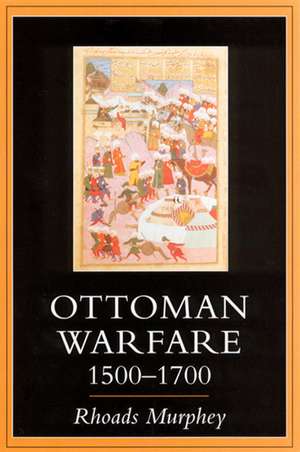Ottoman Warfare 1500-1700
Autor Rhoads Murpheyen Limba Engleză Paperback – feb 1999
Ottoman Warfare is an impressive and original examination of the Ottoman military machine, detailing its success in Europe, North Africa, and the Middle East. Focusing primarily on the evolution of the Ottoman military organization and its subsequent impact on Ottoman society in a period of change, the book redresses the historiographical imbalance in the existing literature, analyzing why the Ottomans were the focus of such intense military concern.Several books have been written on the fiscal, technological, tactical, and political dimensions of Ottoman military history; little has been attempted, however, to recreate or evoke the physical and psychological realities of war as experienced by Ottoman soldiers. Rhoads Murphey seeks to rectify this imbalance, favoring operational matters and providing a detailed study of a number of campaigns: we are offered, for example, vivid descriptions of life in the trenches with the diggers at Baghdad in 1638, who dug a total of five miles at 50 yards a day. Murphey's analysis does not focus on the Ottoman's success or failure in particular campaigns per se; he focuses on understanding the actual process of how the Ottoman military machine worked.This long-awaited work will become the definitive study of Ottoman warfare in the early modern period, and will be invaluable to those studying the Ottoman Empire and early modern European history in general.
Preț: 331.41 lei
Nou
Puncte Express: 497
Preț estimativ în valută:
63.41€ • 66.22$ • 52.37£
63.41€ • 66.22$ • 52.37£
Carte tipărită la comandă
Livrare economică 15-29 aprilie
Preluare comenzi: 021 569.72.76
Specificații
ISBN-13: 9780813526850
ISBN-10: 081352685X
Pagini: 304
Dimensiuni: 156 x 235 x 18 mm
Greutate: 0.43 kg
Ediția:None
Editura: Rutgers University Press
Colecția Rutgers University Press
ISBN-10: 081352685X
Pagini: 304
Dimensiuni: 156 x 235 x 18 mm
Greutate: 0.43 kg
Ediția:None
Editura: Rutgers University Press
Colecția Rutgers University Press
Notă biografică
RHOADS MURPHEY is Senior Lecturer at the Centre for Byzantine, Ottoman and Modern Greek Studies, University of Birmingham. He is the author of several books on the Ottomans, including Regional Structure in the Ottoman Economy.
Cuprins
List of Illustrations
List of Tables
Maps (1-5)
Preface: Scope and purpose of work
Acknowledgments
1. General political framework: the evolving context
2. Material constraints on Ottoman warfare: the immutable context
3. Military manpower and military spending: an attempt at realistic assessment
4. Troop movement and army transport
5. Provisioning the army
6. Ottoman methods of warfare: experience, competence and adherence to standard norms of contemporary military practice
7. Motivational and psychological aspects of Ottoman warfare
8. The aftereffects of Ottoman warfare: a review of the essential elements of Ottoman pragmatism in the military sphere
9. Conclusion--war and social transformation in the Ottoman empire
Appendices
Notes
Bibliography
Index
List of Tables
Maps (1-5)
Preface: Scope and purpose of work
Acknowledgments
1. General political framework: the evolving context
2. Material constraints on Ottoman warfare: the immutable context
3. Military manpower and military spending: an attempt at realistic assessment
4. Troop movement and army transport
5. Provisioning the army
6. Ottoman methods of warfare: experience, competence and adherence to standard norms of contemporary military practice
7. Motivational and psychological aspects of Ottoman warfare
8. The aftereffects of Ottoman warfare: a review of the essential elements of Ottoman pragmatism in the military sphere
9. Conclusion--war and social transformation in the Ottoman empire
Appendices
Notes
Bibliography
Index
Descriere
Ottoman Warfare is an impressive and original examination of the Ottoman military machine, detailing its success in Europe, North Africa, and the Middle East. Focusing primarily on the evolution of the Ottoman military organization and its subsequent impact on Ottoman society in a period of change, the book redresses the historiographical imbalance in the existing literature, analyzing why the Ottomans were the focus of such intense military concern.
